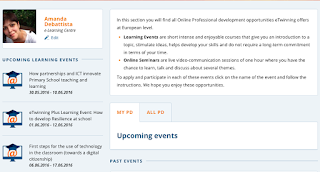eTwinning's Very Own Online Courses
Since the very beginning, Professional Development was very much at the heart of the eTwinning Action. For that is one of the main scopes of eTwinning: to empower teachers (and students), to encourage peer to peer learning through sharing of experiences and skills. Learning takes place informally on the eTwinning Platform all the time; and that is something that we, as NSS, are most proud of.
eTwinning also boasts a considerable array of 'formal' professional development opportunities; most notably, what we call the eTwinning Learning Events.
Learning Events are short, online courses, usually of a duration of not more than 15 hours spread over 10-14 days. There are a good number of themes and topics to choose from - starting from basic eTwinning training, how to create a pedagogically sound project, to more specific topics such as language or STEM teaching, the use of online tools, tablets, etc. An updated list of all eTwinning Events can be accessed at any time on
Maltese teachers have always been encourage to participate in the above training opportunities, which, I might add, are free of charge and carry a certificate of completion endorsed by European Schoolnet. In 2011 however, an idea started to form in our minds that perhaps it would have been a good idea to also offer an in-house Learning Event specifically targeted to Maltese Teachers. And so the eTwinning Learning Event for Maltese Teachers was born.
The first two instillments (in 2012 and in 2013) were delivered by our then eTwinning Ambassador, Ms. Marianne Schembri. Following a change in carrier, I took it up to myself to continue with the legacy and have so far delivered two Events myself, both focusing on eTwinning and Online Collaborative tools.
 Due to a change in the way Learning Events are hosted, the original platform is no longer available and thus I cannot disseminate the work already done. I managed however, to secure a couple of screenshots from the old platform and I am reproducing them here.
Due to a change in the way Learning Events are hosted, the original platform is no longer available and thus I cannot disseminate the work already done. I managed however, to secure a couple of screenshots from the old platform and I am reproducing them here.As a venture, locally organised eTwinning Learning events had a similar outcome to that of Webinars (see previous posts). They still required extensive promotion and advertising, through our social networking outlets as well as an endorsement via Departmental Letter Circulars issued a month or so before the commencement of the online course. An average of 15 or so participants attended for each installment, and as was the case with the Webinars, it was a most enjoyable experience for me to be able to facilitate and mentor the participants throughout this online learning experience.
For the near future, my plan is to hold more Learning Events, but with a few hours of face to face meetings thrown in as well - and create the first eTwinning Malta Blended Course/Learning Event.











